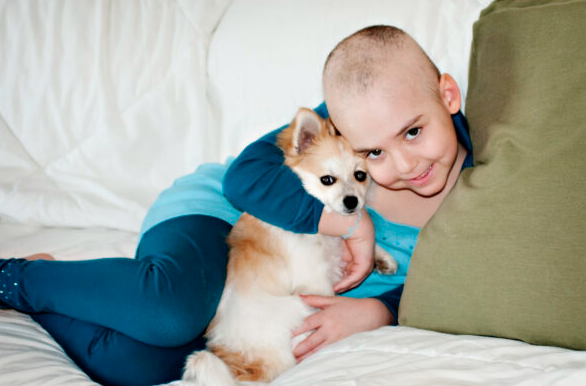Celebrating 10 Years Cancer-Free!
- Emily Whitehead, the first pediatric cancer patient to receive CAR T-cell therapy, recently celebrated an incredible milestone: 10 years cancer-free!
- At just 5 years old, Emily was fighting for her life; she had been diagnosed with acute lymphoblastic leukemia, a type of blood cancer.
- Chemotherapy wasn't working, so she became the first pediatric cancer patient to receive a relatively new cancer treatment called CAR T-cell therapy. And the treatment was a success!
At just 5 years old, Emily, who's from Philipsburg, Penn., was fighting for her life; she had been diagnosed with acute lymphoblastic leukemia, a type of blood cancer.
Read MoreView this post on Instagram
"I'm feeling great. I'm really healthy. I'm driving now; I got my driver's license and all that," she said with a laugh during the 3rd Hour of the TODAY Show, "but yeah, I'm very healthy."
Emily also shared that she's starting her college search, and her dad added that she's thinking of becoming a filmmaker. (Her cancer journey has recently been turned into a film, entitled Of Medicine and Miracles. The film was created by Academy Award-winner Ross Kauffman, and it'll premiere at the notable Tribeca Film Festival in New York City next month. The film includes family footage, along with video taken from a film crew.)
View this post on Instagram
She's already accomplished so much in life, including co-founding the Emily Whitehead Foundation alongside her parents, Tom and Kari Whitehead.
Emily appeared on air of the TODAY Show alongside her parents, as well as her oncologist, Dr. Stephan Grupp, who's the director of the cancer immunotherapy program at the Children's Hospital of Philadelphia, to tell the world how she's doing. And she couldn't be doing better.
Emily's Cancer Battle
After the six-week process of modifying Emily's cells and putting them back in her body, the side effects began to kill her, and she was put into a coma.
Emily's doctor told her father, Tom, that "she wasn't going to make it." In fact, he had already written a letter explaining why she didn't survive.

But then, a miracle happened.
Emily miraculously survived and her body began to recover. She woke up just four days later, on her 7th birthday.
On the TODAY Show, Dr. Grupp was asked if he would consider CAR T-cell therapy a cure for blood cancers.
“I believe that Emily is cured of leukemia. Is that a cure for everyone? That’s not how any of these things work,” he said, “but we have patients who are 5, 6, 7, 8, 9 and 10 years out, and that feels like a cure to me.”
What is CAR T-Cell Therapy & How Does it Work?
Our immune system was designed to fight off foreign invaders such as viruses, bacteria and yes, cancer. Sometimes, cancer cells can evade detection and continue to grow. But CAR T-cell therapy essentially re-trains your immune system to make it a more efficient, and more effective, cancer fighter.
The process starts when your doctor intravenously removes a sample of your blood. With a procedure called leukapheresis the removal of blood to collect specific blood cells your blood flows into a machine that separates out the T cells; it then returns the other blood components, such as red blood cells, platelets, etc.
The T cells are then sent out to a lab, where technicians insert an anti-cancer gene into them. That new gene causes special receptors called chimeric antigen receptors to pop up on the surface of the T cells. Those receptors are like homing devices that will lock onto the matching antigen on the surface of your cancer cells.
Once the T cells are back from the lab, you'll first need treatment to prepare your body to receive the new, genetically modified T cells.
"Patients are primed with three to four days of a mild form of chemotherapy, so that their body does not reject those genetically modified cells," Dr. Siddhartha Ganguly, previous director of the lymphoma and myeloma program at the University of Kansas and current section chief of hematology at Houston Methodist Oncology Partners, previously told SurvivorNet.
"And then those cells are infused, just like a blood transfusion."
Contributing: Marisa Sullivan
Learn more about SurvivorNet's rigorous medical review process.


